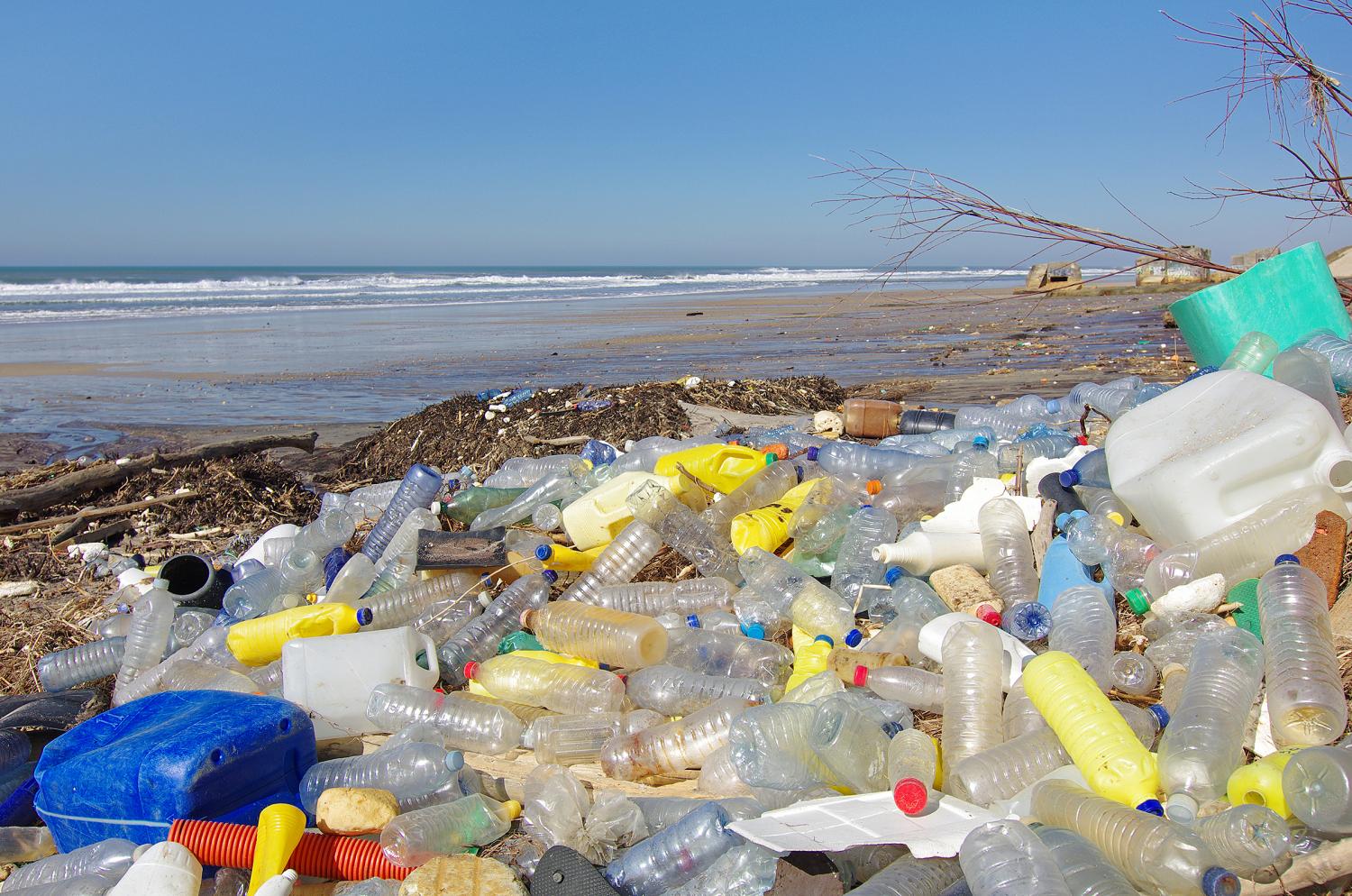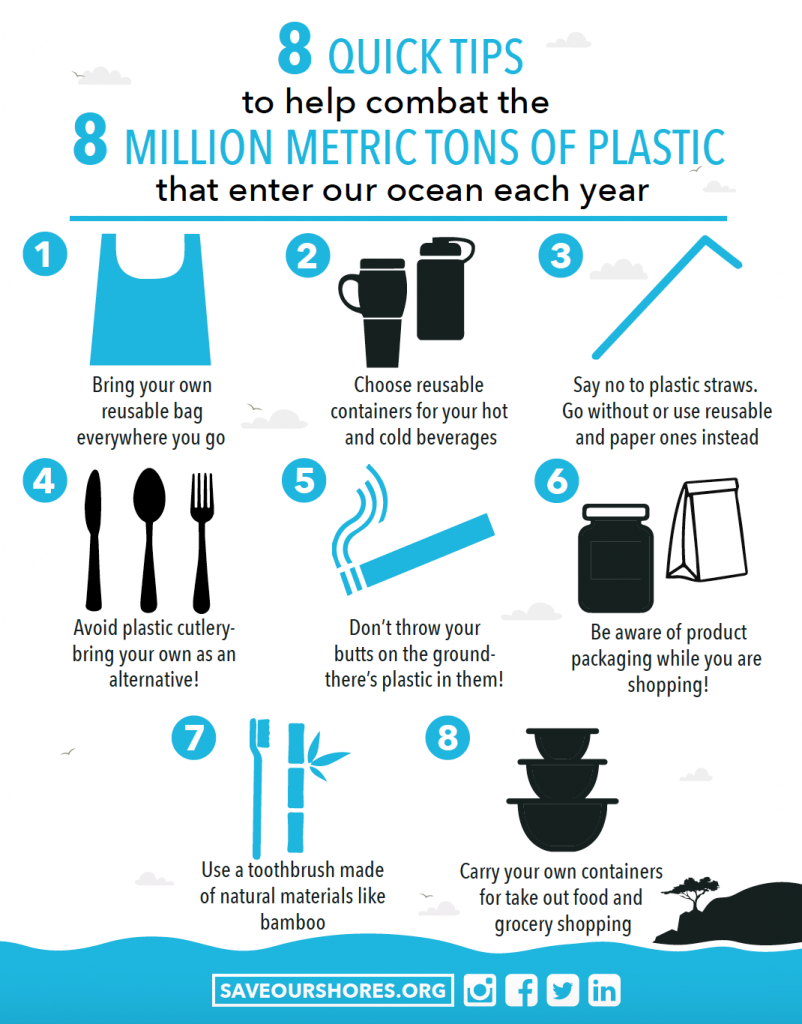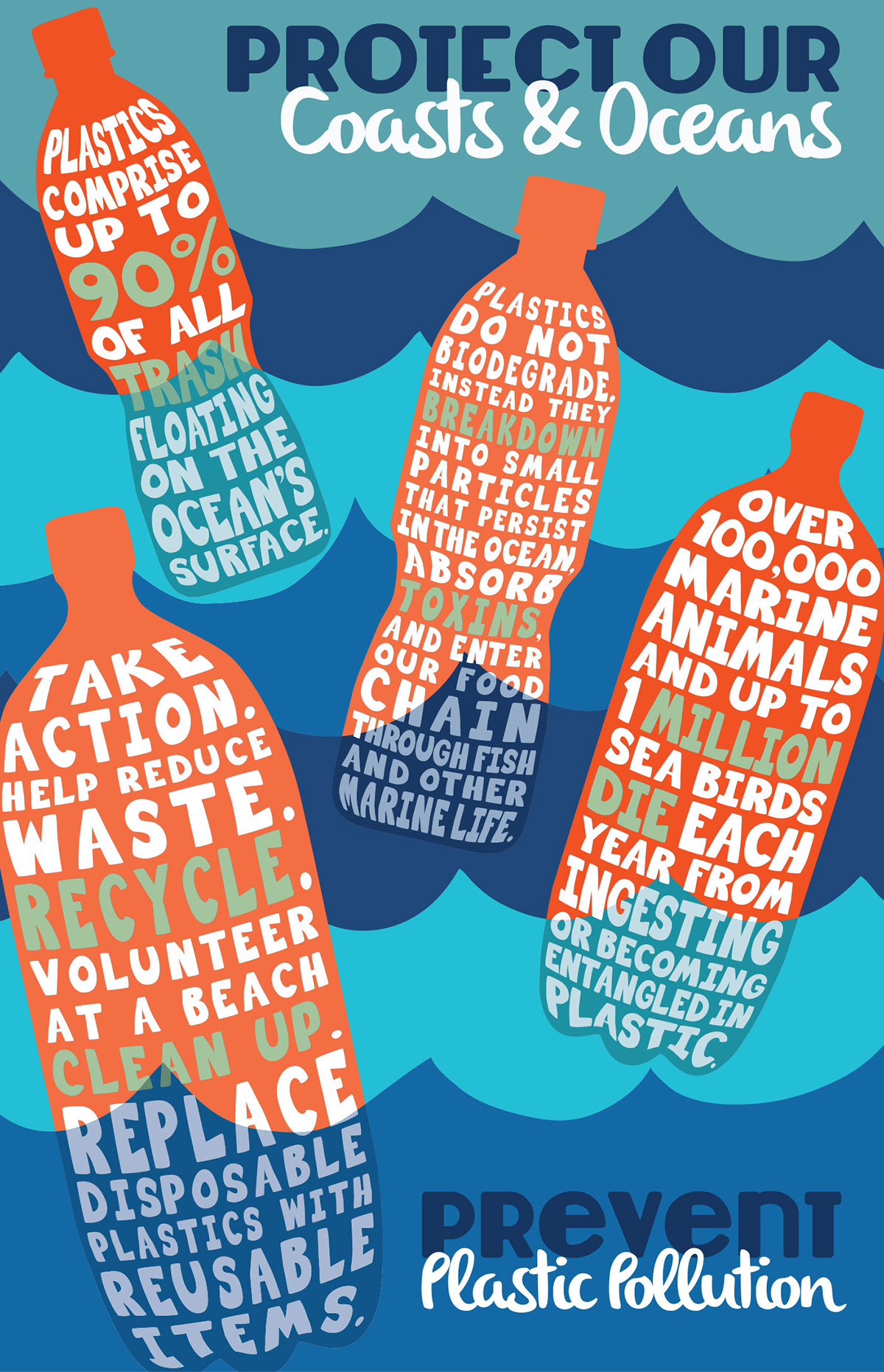







A microbiological issue that we have been dealing with for years is pollution in our oceans, especially plastic pollution. Every year five million to fourteen million tons of plastic flow into our oceans from costal areas. This is a very serious issue that we should try harder to fix. This affects so many things on our planet, from animal life, ocean life, to even us as humans. But yet not much has improved to help fix this ongoing issue.
Pollution in our ocean has an impact on many things. One of the major issues we see is the pollution makes some of our food sources sick. Plastic and debris gets lodged into our sea life and either kill these species or makes them very sick. Plastic/ microplastics block aquatic creatures’ digestive tracts, diminish the urge to eat, and alter feeding behavior, all of which reduce growth and reproductive output. Their stomachs stuffed with plastic, some species starve and die. This doesn’t only affect those species lives, most of them end up in our stores and on our plates. Therefore, we as humans are consuming plastic/fiber/debris filled fish, shrimp etc.
Plastic doesn’t only have mechanical effects on these species, it also has chemical impacts. This is due to free-floating pollutants that wash off the land and into our seas-such as polychlorinated biphenyls, polycyclic aromatic hydrocarbons, and heavy metals-tend to adhere to their surfaces. Polyethylene is used to make some types of plastic bags. Some research has shown that fish that had ingested the treated plastic suffered more liver damage than those that had consumed virgin plastic. Another experiment demonstrated that oysters exposed to tiny pieces of polystyrene-the stuff of take-out food containers-produced fewer eggs and less motile sperm. Some of these chemicals are endocrine disruptors-chemicals that interfere with normal hormone function, even contributing to weight gain.
One of the most devastating elements of this pollution is that plastics takes thousands of years to decay. As a result, fish and wildlife are becoming intoxicated. The Pacific Ocean between Japan and North America is one of the most polluted areas due to plastic. This area is where we get lots of salt water fish. Therefore, the toxins from the plastics have entered the food chain, threatening human health. If we do not fix plastic pollution, extinction of species, wildlife, and sea life will occur. Some researchers presume that if we continue to use plastic at the current rate, ocean plastic will outweigh all the fish in the sea by 2050. This will hit our food supply and affect us as humans.


Currently there are many actions being taken to help prevent pollution of plastics. Some grocery stores like Sams Club, Costco, Aldi, etc. have stopped using plastic bags at check outs. Other corporations such as Starbucks, have gone strawless to help prevent plastic straw pollution. Another thing I have seen some corporations or stores do, is sell glass bottles versus plastic, trying to move towards going plastic free. Some companies that are actively trying to reduce plastic waste and make decomposable products are Celestial Tea, Mindful Inc, No Evil Foods etc. In December 2019, Peru’s Congress passed a law to phase out single-use plastic bags.
Microbes play a huge role in helping get rid of plastic as well. PETase, the main enzyme with the ability to degrade PET, utilizes plastic as its primary energy source, breaking it down into smaller subunits, making them less likely to entangle marine fauna and speeding up the lengthy biodegradation process of PET. A PubMed article we found explains the two-enzyme system for plastics. This article is called Characterization and engineering of a two-enzyme system for plastics depolymerization. Within the past year they have found a two-enzyme system that deconstructs monomers. MHETase and PETase turn into a PET deconstruction. This is very important because the two together will break down the molecules in plastic, which will over all help with the pollution in the ocean. PETase and MHETase are something we agree with and think they are highly beneficial.
There are many ways that one can help the pollution of plastics. Some ways are reducing your use of single use plastics. The easiest most direct way that you can get started is by reducing your own use of single-use plastics. Single-use plastics include plastic bags, water bottles, straws, cups, utensils, dry cleaning bags, take-out containers, and any other plastic items that are used once and then discarded. The best way to do this is by refusing any single-use plastics that you do not need (straws, plastic bags, takeout utensils, takeout containers), and purchasing and carrying with you reusable versions of those products, including reusable grocery bags, bottles, utensils etc. Another way is by recycling properly. This should go without saying but when you use single-used and other plastics that can be recycled, always be sure to recycle them. Some research shows that just 9% of plastic is recycled worldwide. Recycling helps keep plastics out of the ocean and reduces the amount of new plastic in circulation. You can also participate or organize a beach cleanup. You can be apart of this to help remove plastics from the ocean and prevent them from getting there in the first place by participating in or organizing a cleanup of your local beach or waterway. This is one of the most direct ways to fight ocean plastic pollution.
I don’t think there are many opposing views on stopping plastic pollution, but I have seen some opposing views on stopping plastic production. For example, there are some opposing views on stopping the production of plastic bags. Some may argue that plastic bags have a lighter environmental footprint than paper, and in some cases are preferable to reusable bags. The opposers also argue that why not recycle? They state that since were never going to ban all plastic bags and containers-maybe the answer is to support and develop robust recycling streams for plastic. Like PET bottles, plastic bags are 100% recyclable. They state that the plastic isn’t the problem, the litter is the problem. Most of the arguments against banning plastic production are coming from owners of plastic companies and recycling companies or VPs of them. The arguments stated above came from a VP Mark Daniels, who is the VP of sustainability for Hilex, a leading manufacturer and recycler of plastic bags.
For some companies they also do not want to stop the production of plastic due to the fact that it is way cheaper. For example it is cheaper for business's like restaurants to use plastic versus other materials that are pricer.
Plastic is everywhere in the world, so switching to non-plastic items is extremely hard. Below are just a few substitutions you can use instead of using plastic.
- Paper straws
- Paper bags/ reusable cloth grocery bags
- Reusable water bottles
- Glass bottles for milk
- Reusable food wraps
Above are just a few of the many solutions you can participate in to help with plastic pollution. Some other ways are to help educate people by buying shirts to wear to educate others, share things about pollution on social media, attend a clean up site, spread the awareness to your friends and family, among many other things. These are just a few ideas to help you get started!
Below is a video that educates you on plastic and more in depth ways we can prevent plastic pollution.
When thinking about ways you can help stop the spread of plastic pollution, an easy way to remember how to help is by remembering the 7 R’s:
-Rethink
-Refuse
-Reduce
-Reuse
-Recycle
-Regulate
-Research
Attached below is a link to a video describing how we can take action on these 7 R’s.
If you answered yes to the question above, attached is a link to our survey that you can take if you are ready to help make a change! (Even if you may have answered no, still check it out!).
https://www.surveymonkey.com/r/V8SLDWB
After you completed this survey, if you have found yourself answering more questions regarding you and those around you using single-use plastic's instead of reusable items then I would highly encourage you to look into changing your lifestyle and encouraging those around you to as well to help save our planet!
Are you ready to make a change? Take your pledge today!

Knott BC;Erickson E;Allen MD;Gado JE;Graham R;Kearns FL;Pardo I;Topuzlu E;Anderson JJ;Austin HP;Dominick G;Johnson CW;Rorrer NA;Szostkiewicz CJ;Copié V;Payne CM;Woodcock HL;Donohoe BS;Beckham GT;McGeehan JE; “Characterization and Engineering of a Two-Enzyme System for Plastics Depolymerization.” Proceedings of the National Academy of Sciences of the United States of America, U.S. National Library of Medicine,
https://pubmed.ncbi.nlm.nih.gov/32989159/.
https://foodtank.com/news/2019/06/16-companies-rethinking-packaging/
https://www.greenbiz.com/article/defense-plastic-bag
https://www.oceanicsociety.org/resources/7-ways-to-reduce-ocean-plastic-pollution-today/
https://nationalgeographic.com/environment/article/ocean-plastic-pollution-solutions
https://nationalgeographic.com/magazine/article/plastic-planet-health-pollution-waste-microplastics
https://serc.carleton.edu/NAGTworkshops/health/case_studies/plastic.html
